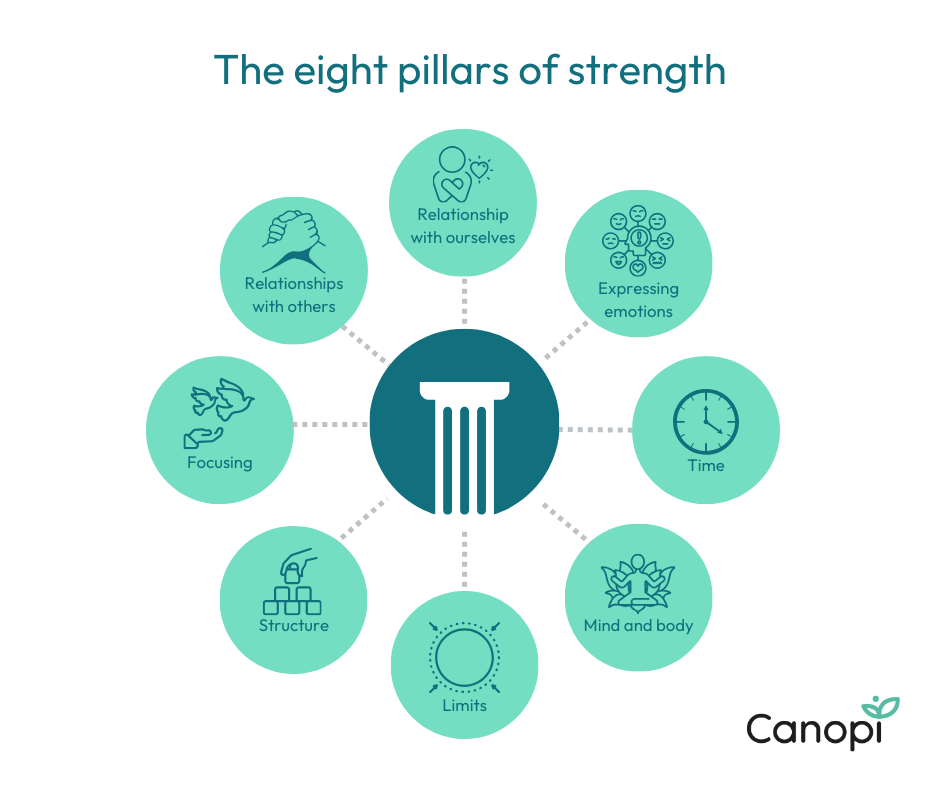When you lose a loved one, it can be very difficult to imagine a life without them. After going through the five stages of grief, however many times over, most can reach a level of acceptance but what does this actually look like?
Grief counsellor, Dr Lois Tonkin worked with a young mother. After the death of her child, the mother explained that she felt consumed by her grief and imagined that her grief would get smaller as time went on. Instead, she felt that the size and level of her grief remained the same but her life around it grew bigger.
Eight pillars of strength for grief
Psychotherapist, Dr Julia Samuel highlights eight principles to remember when dealing with grief, also known as the Eight Pillars of Strength.

Our relationship with others and the one who has died
How can we continue a relationship with a person who is no longer with us? What if we had a difficult relationship with them when they were present?
Finding a way to show that relationship externally has been known to increase feelings of positivity during the grieving process. This could be wearing their favourite colour or cooking their favourite recipe. Prioritising the other key relationships in our lives can also bring us joy, support and fulfilment in many ways.
Relationship with ourselves
During the grieving process, it’s easy to become angry at ourselves for feeling certain emotions such as relief when a person has gone. It’s important to be self-compassionate during this time and know that feelings do not make you a bad person. Understanding the five stages of grief can help with this.
Ways to express emotion
Find a way to express your grief and loss. This could be through hobbies, talking to friends or journaling.
Whilst it is healthy to express our emotions, we should work on our own resilience to things that trigger us. This could be knowing what triggers you and to slow down and take time out when it happens.
Time
The key principle here is to take more time than is usually needed to make decisions, big or small to avoid regret. You may find it difficult to look ahead during this time, so staying present and knowing that there is no set timeframe for the grieving process can help.
Mind and body
Neuroscientists say that every thought has a physical impact on the body. Grief can feel a lot like fear and make it difficult for us to relax. That’s why it’s essential that we find a way to regulate ourselves through a combination of cardiovascular exercise with meditation exercises and regular eating habits. You could try:
- Planning meals ahead of time to make sure you eat well
- Taking a light run or walk outdoors
- A free guided meditation from Revive Prescribed
Limits
Sometimes it is difficult to say no to family, friends or co-workers when we are grieving, especially when they think they know what is best for us during this difficult time. On the other hand, if we always say no, we may be missing out on opportunities that will help us with our grief.
Dr Samuel recommends giving yourself time to acknowledge others’ wishes before saying what is right for you. On some occasions, it may be useful to ‘try’ something but know that you can always say no next time if it’s not right for you.
Structure
Healthy habits can be extremely helpful when managing our own grief. The aim here isn’t to control every aspect of your life, but to have a simple plan with some flexibility within it.
You could think about dedicating certain parts of the day to good habits such as:
- Exercise
- Household chores
- Time to remember the person who has died
- Calming activities
- Sleeping habits
Focusing
‘Focusing’ is a bodily intelligence technique that allows us to release emotions that often go unvoiced.
It involves finding a quiet space and taking note of our body sensations and any feelings that arise as we do before releasing them. Read more about focusing from the eight pillars of strength.
Need support with grief?
If you are feeling intense sadness as a result of grief, you might consider seeking help through your GP. NHS and social care workers in Wales can access help and support through Canopi by referring themselves online.

